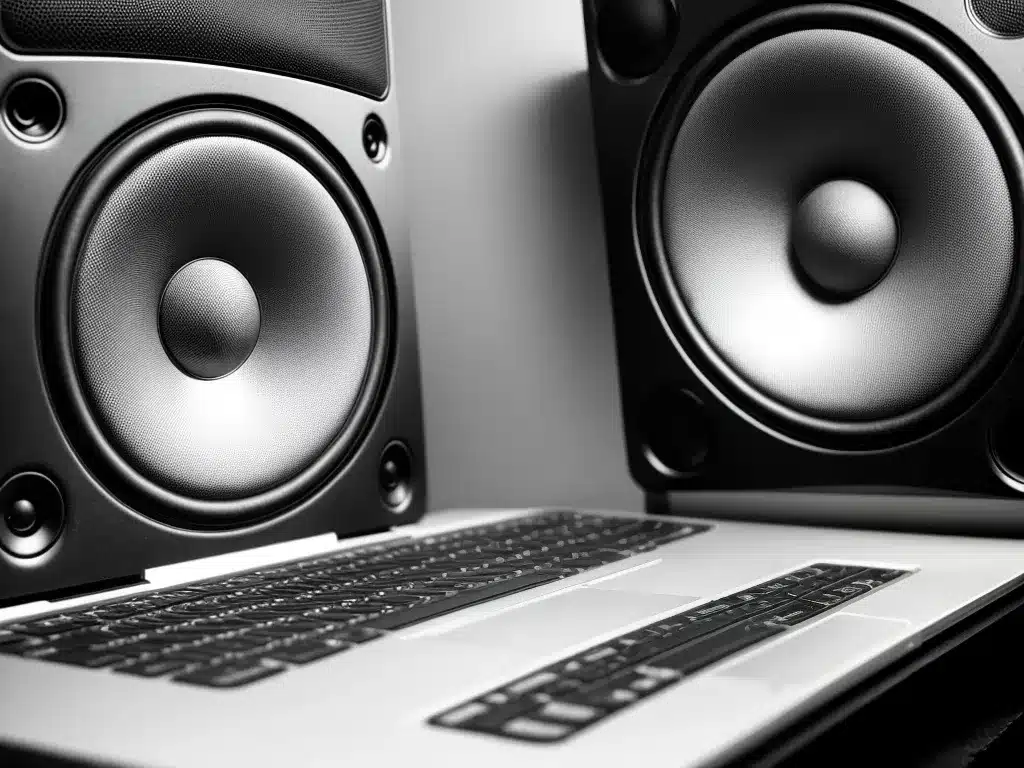
Introduction
Having distorted or muffled sound coming from your laptop speakers can be very frustrating. However, in most cases, this issue can be fixed by making a few adjustments and troubleshooting some common problems. In this guide, I will walk you through the main causes of distorted laptop audio and the steps you can take to resolve them.
Check Audio Settings
The first thing to check is your laptop’s audio settings. Often, distortion is caused by having the volume set too high or enabling audio enhancements that can muddy the sound.
-
Lower the volume – Turn down the volume on both your laptop and in any media players you are using. High volumes can cause the speakers to vibrate excessively, resulting in distortion.
-
Disable audio enhancements – Laptops often come with pre-installed “enhancement” software that claims to improve sound quality. However, these can often have the opposite effect. Disable any audio enhancements in your Settings menu.
-
Adjust equalizer settings – If you have an equalizer available, try reducing the mid and lower frequencies that might be overwhelming the small laptop speakers. Boost higher frequencies to improve clarity.
Update Audio Drivers
Outdated, corrupted or missing audio drivers can also cause strange buzzing, crackling and other interference with laptop speakers.
-
Go to Device Manager, find your laptop’s audio driver and update it to the latest version from the manufacturer’s website.
-
If the driver is corrupted, uninstall it, reboot your laptop, and let Windows automatically reinstall the driver to restore defaults.
Updating drivers will often fix audio distortion issues caused by software problems.
Check for Physical Damage
With laptops, the speakers are small and delicate. Physical bumps and drops can damage the speaker components or connections.
-
Inspect the external speakers and area around them for any cracks, gaps or rattling that could indicate loose parts.
-
Use headphones to check if audio sounds normal through the headphone jack. If so, the problem is isolated to the internal speakers.
-
Test with external speakers if possible to further isolate the issue.
If only the built-in speakers are affected, they may need replacement if physically damaged.
Eliminate Background Noise
Too much background noise and interference can also make laptop audio sound heavily distorted.
-
Close any other programs using the microphone or speakers.
-
Turn off notifications and system sounds to eliminate operating system noises.
-
Use your laptop in a quiet area without exhaust fans, traffic or other loud ambient noises that can clash with the speakers.
Isolating the laptop from background noise can help clarify and improve the audio quality.
Adjust Application Settings
Check the audio settings within any applications that seem to be outputting distorted sound.
-
Media players may have an equalizer, volume boost or other effects enabled that are reducing the sound quality.
-
Streaming/web applications can be configured to use lower bitrates that do not play nicely through laptop speakers. Increase quality if possible.
-
Games often have a range of audio options. Lowering in-game music while raising FX may improve balance.
Tweaking audio settings for individual apps can target distortion caused by that specific software.
Improve Physicalplacement
Laptop speakers sound best when the unit is placed on a flat, hard surface that allows the sound to reflect and resonate.
-
Do not place laptop on soft surfaces like beds or sofas that can muffle the audio.
-
Elevate the laptop slightly by propping up the rear edge to direct sound upwards.
-
Avoid blocking vents as reducing airflow can cause the speakers to rattle.
-
Use a sound reflecting surface like a book or a tablet stand under the laptop.
Tilting the laptop screen back also helps redirect sound towards the listener for enhanced clarity.
Summary
- Lower volume levels, disable enhancements, and tweak equalizer settings.
- Check for driver issues and physical damage to speakers.
- Reduce background noise for clearer sound.
- Adjust application and game audio settings.
- Improve physical placement for best sound reflection.
With some trial and error using these tips, you should be able to resolve common causes of laptop speaker distortion and regain solid, clear audio. But for persistent hardware-related problems, replacement of the speakers may ultimately be required.












